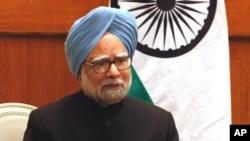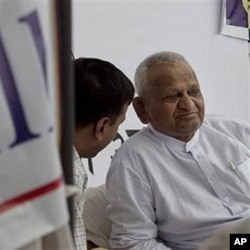Indian Prime Minister Manmohan Singh says his government is taking steps to counter widespread corruption. An anti-corruption bill is expected to be introduced soon in parliament. Meanwhile, a prominent social activist says he will begin a fast to the death on Tuesday to protest the government's "too-weak" legislation.
Singh marked 64 years of his country's independence from British rule with a promise of the "strictest possible action" against corruption.
The prime minister says he has spoken extensively on corruption because it is a challenge and a matter of deep worry. But he says the government does not have a magic wand to solve the issue. He says the government is fighting corruption on many levels, and he appeals to all political parties to join in the fight.
Key threat
Public surveys suggest most Indians view widespread corruption as the chief threat to the country's security. Over the past year, Indian media have carried astonishing headlines about alleged graft involving telecommunications licenses, the Commonwealth Games, high-profile land and real estate projects.
In what may be India's most prominent graft case, India's former telecommunications minister faces a possible prison term for allegedly selling 2G mobile phone spectrum licenses at below market value. He told a court recently the prime minister and senior cabinet officials were fully aware of his actions.
Legislation
Under heavy pressure from activists earlier this year, Prime Minister Singh's ruling Congress party introduced an anti-corruption bill that would set up a civil organization to act as a watchdog over government officials.
Anna Hazare, an elderly social activist who has long pushed for a so-called "jan lokpal," or people's ombudsman, says the government's bill is a weak and watered down version of what he is demanding. Hazare wants a lokpal to be able to expose and prosecute the prime minister himself, as well as members of India's judiciary.
Hazare says he will resume a "fast unto death" on Tuesday to protest the government's bill. A similar fast in April fueled a broadcast media frenzy, along with a wave of popular demonstrations around the nation.
Parliament
Singh said "no single, big step" can be taken to eradicate corruption, and that action needs to proceed on a number of fronts simultaneously. He urged those interested in the legislation to pursue their aims using India's democratic structures.
Singh said, only parliament can decide now what kind of anti-corruption bill India will have. He said he knows people have differences about certain aspects of the proposed law -- but they should make their views known through parliament, political parties and even the media. Singh said they should not, however, resort to protests and hunger strikes.
The government has given Anna Hazare a conditional three-day permit for the fast in the Indian capital.





